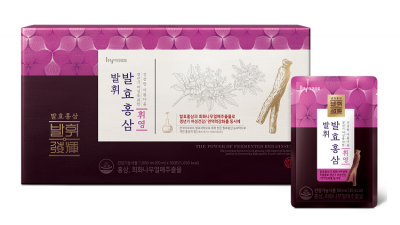Functional foods in Korea: General foods can now carry claims if there is scientific basis – regulator

The Ministry of Food and Drug Safety (MFDS) made the official announcement right before the new year.
“Functional labelling for general foods is intended to promote the vitality of the food industry by inducing the development of functional raw materials in Korea
“At the same time, it provides correct information for the consumers when selecting [their purchase],” the MFDS said.
The regulator also laid out standards for the functional raw materials used, manufacturing and labelling requirements, as well as the product quality and safety.
Currently, 29 functional raw materials have been approved for use, based on evidence that they are effective and do not cause health problems when consumed in large amounts.
These raw materials include ginseng, red ginseng, chlorella, spirulina, propolis extract, guava leaf extract, inulin, probiotics etc.
In the case of red ginseng, functional claims such as “improves immunity and fatigue” are permitted, while chlorella and spirulina can claim to benefit the skin health and act as an antioxidant.
A competitor to nutra?
Due to strict requirements and a lack of understanding of the new framework, it is unlikely that the general foods with functional claims could pose a strong challenge to the nutra market at this point, regulatory experts told NutraIngredients-Asia.
“The requirement [to make general food with functional claims] is very strict.
“This regulation did open a door to food companies using functional materials. But I do not think the functional food industry will be affected much due to the strict requirements,” Lorraine Li, Korea regulator analyst at Chemlinked said.
“At present, most general food companies do not fully understand the associated framework. This requires promotion from consultancies [with knowledge of the industry and regulations] to guide enterprises set up this particular business portfolio,” Suah Sung, consultant at regulatory firm CIRS Korea, added.
General foods with functional claims could only be manufactured in HACCP-certified facilities using GMP-made functional ingredients.
Suah believes this will need to more companies wanting to achieve these certifications.
“We foresee that there will be a gradual increase in the number of food ingredients enterprises and manufacturing companies that would want to attain the GMP and HACCP certification respectively.
“This will in turn raise the safety and reliability of the food industry,” Sung said.
Labelling requirements
Businesses need to ensure that its general foods making functional claims are clearly distinguished from the health functional foods.
As such, their products will need to add in the phrase “this is not a health functional food” on the main display.
This is to prevent confusion amongst consumers on what is recognised as a general food with functional claims and a health functional food.
The latter contains a “Health Functional Food” mark on the packaging and are able to make health claims related to urinary tract health, vagina health, prostate health, and memory function.
To further protect the consumers, general foods bearing functional claims are not allowed to be marketed towards children, pregnant women, and patients.
Unlike health functional foods, these products are also not allowed to make “socially sensitive” claims related to sexual function.
Also, the business operator is required to conduct a quality inspection on the functional ingredients every six months.
Products that have a similar format to health functional food, including tablets and capsules, are not allowed to bear functional claims as well.
Future plans
Aside from introducing the new framework, the MFDS said it planned to introduce a pre-notification system in the future.
This will be modelled after the framework in the US and Japan, where the businesses submit scientific data on the functionality of a newly developed raw material to the MFDS for pre-market review.
The purpose is to gradually expand the list of permitted functional raw materials.
The MFDS has been mulling over the introduction of functional claims in general foods since 2019.
According to a consumer survey conducted in 2019, consumers have raised concerns, such as price hike and a rise in fake health claims if general foods could bear functional claims.



















